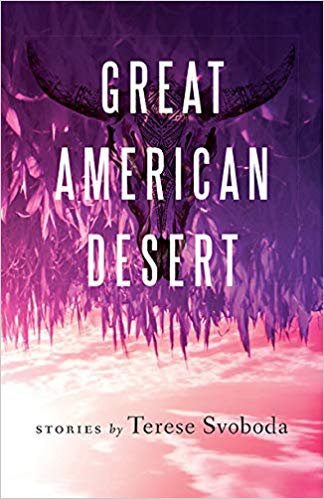
(Mad Creek/Ohio State University Press, 2019)
REVIEW BY JODY KENNEDY
—
Terese Svoboda’s Great American Desert is a collection of twenty-one short stories linked by a common geographic location in the Middle West. The stories examine our relationships to one another, the land, and the natural environment beginning with the prehistoric era “Clovis Camp” and ending with the post-apocalyptic “Pink Pyramid.” Svoboda is the author of five collections of poetry, five novels, a memoir, a book of translation, a novella and stories, most recently the biography Anything That Burns You: A Portrait of Lola Ridge, Radical Poet.
I had never read any of Terese Svoboda’s work and was immediately captivated by the light-hearted, humorous and often stark poetic prose found in “Clovis Camp” and in the stories that followed. One of the book’s most prevalent themes, echoing the Biblical Adam’s dilemma, is touched on in “Clovis Camp,” and the following “Major Long Talks to His Horse,” but its the third story, “Dutch Joe,” that seems to sum it up perfectly:
“Lands sakes is what we’re always exclaiming because land is all we’re good for, all the sakes there is or ever will be. Each of us, fifty or so strong, have fled a country crowded with kin or else lorded over, every inch of the land spoken for down to the last hop of hare, or squawk of fowl. We settlers have pushed all the way into the pockets of Lady America, hoping to take her wealth for ours, her endless waving grain and her cattle in abundant herds. Through our boot soles, thin as they are, we perceive the urgency of the land’s fecundity to be ours, it is so empty and waiting. Even the clouds suspended above us are our clouds, borne in the reflection of our great desire. We slake our thirst for our own land by possessing Lady America with the plow. We are homesteaders.”
The love story, “Bomb Jockey,” contains a series of fantastic events offered up in Svoboda’s lyrical and often startling poetic imagery:
“The waitress at the cafe? remembers her well enough to have a conversation but she’s short, more interested in the mercury spill she saw on her way to work. How beautiful and strange the great gobs of liquid metal were, slithering all over the ground in amongst the snowed-in crocuses.”
In “Ogallala Aquifer” a man-made mountain of toxic dirt begins to grow out of a government-sanctioned garbage dump reminding us of our own present-day Great Pacific Garbage Patch (an estimated 1.6 million square kilometers of trash and plastics floating somewhere between California and Hawaii) or the ugly chemical pesticide wars going on in the Arkansas Delta farming community or any of the other numerous transgressions we continue to commit for personal or collective gain or convenience and against our better environmental interests.
The final story, “Pink Pyramid,” one of my favorites, is a post-apocalyptic vision of America made more bearable through Svoboda’s deft poet’s heart:
“She sneezes. They’ve raised a cloud of pink dust. There’s a couple of other clouds in the distance but theirs is the thickest, the most recent. The dust coats her throat, the little hairs on her arms.”
Despite the difficult subject matter, “Pink Pyramid” like many of the other stories in the book, shares a mélange of personal struggle, longing, and tenderness which left me strangely hopeful for the human race.
While Great American Desert delivers a sometimes harsh critique of America’s relational and historical trajectories, its lively mix of humanity, absurdity, and insanity might leave some of us to wonder if we aren’t actually enjoying every current episode or rerun of our great American experiment, passion play and not soon to be forgotten dream.
—
![[PANK]](https://pankmagazine.com/wp-content/themes/pank/assets/images/pank-logo-large.png)
